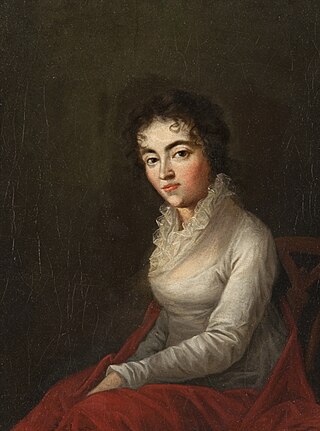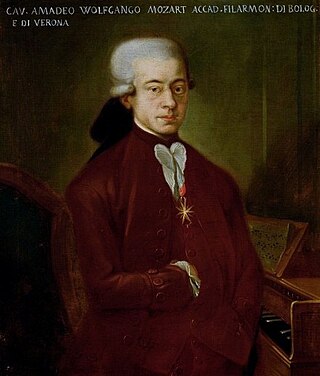Related Research Articles

Marie Antoinette was the last queen of France prior to the French Revolution. She was born an archduchess of Austria, and was the penultimate child and youngest daughter of Empress Maria Theresa and Emperor Francis I. She became dauphine of France in May 1770 at age 14 upon her marriage to Louis-Auguste, heir apparent to the French throne. On 10 May 1774, her husband ascended the throne as Louis XVI and she became queen.

Johann Georg Leopold Mozart was a German composer, violinist, and theorist. He is best known today as the father and teacher of Wolfgang Amadeus Mozart, and for his violin textbook Versuch einer gründlichen Violinschule (1756).

The Affair of the Diamond Necklace was an incident from 1784 to 1785 at the court of King Louis XVI of France that involved his wife, Queen Marie Antoinette.

Charlotte of Mecklenburg-Strelitz was Queen of Great Britain and Ireland as the wife of King George III from their marriage on 8 September 1761 until her death in 1818. The Acts of Union 1800 unified Great Britain and Ireland into the United Kingdom of Great Britain and Ireland. As George's wife, she was also Electress of Hanover until becoming Queen of Hanover on 12 October 1814. Charlotte was Britain's longest-serving queen consort, serving for 57 years and 70 days.

Maria Anna Walburga Ignatia Mozart, called "Marianne" and nicknamed Nannerl, was a musician, the older sister of Wolfgang Amadeus Mozart (1756–1791) and daughter of Leopold (1719–1787) and Anna Maria Mozart (1720–1778).

Marie Antoinette is a 2006 historical drama film written and directed by Sofia Coppola. It is based on the life of Queen Marie Antoinette, played by Kirsten Dunst, in the years leading to the French Revolution. It won the Academy Award for Best Costume Design. It was released in the United States on October 20, 2006, by Sony Pictures Releasing.

Maria Constanze Cäcilia Josepha Johanna Aloysia Mozart was a trained Austrian singer. She was married twice, first to Wolfgang Amadeus Mozart; then to Georg Nikolaus von Nissen. She and Mozart had six children: Karl Thomas Mozart, Franz Xaver Wolfgang Mozart, and four others who died in infancy. She became Mozart's biographer jointly with her second husband.

"Let them eat cake" is the traditional translation of the French phrase "Qu'ils mangent de la brioche", said to have been spoken in the 18th century by "a great princess" upon being told that the peasants had no bread. The French phrase mentions brioche, a bread enriched with butter and eggs, considered a luxury food. The quote is taken to reflect either the princess's frivolous disregard for the starving peasants or her poor understanding of their plight.

Mitridate, re di Ponto, K. 87 (74a), is an opera seria in three acts by the young Wolfgang Amadeus Mozart. The libretto is by Vittorio Amedeo Cigna-Santi, after Giuseppe Parini's Italian translation of Jean Racine's play Mithridate.

FranzXaver Richter, known as François Xavier Richter in France was an Austro-Moravian singer, violinist, composer, conductor and music theoretician who spent most of his life first in Austria and later in Mannheim and in Strasbourg, where he was music director of the cathedral. From 1783 on Haydn's favourite pupil Ignaz Pleyel was his deputy at the cathedral.

"The Greatest Gift" is a 1943 short story written by Philip Van Doren Stern, loosely based on the Charles Dickens 1843 novella A Christmas Carol, which became the basis for the film It's a Wonderful Life (1946). It was self-published as a booklet in 1943 and published as a book in 1944.

Psyren, literally meaning Siren and stylized as PSYЯEN, is a Japanese manga series written and illustrated by Toshiaki Iwashiro. The manga was serialized in Shueisha's shōnen manga magazine Weekly Shōnen Jump from December 2007 to November 2010, with its chapters collected in sixteen tankōbon volumes. Psyren follows Ageha Yoshina, a high school student who is chosen by Nemesis Q as a participant in the Psyren games. The games take place in a world known as Psyren. In North America, Viz Media licensed the series for English release and serialized its chapters in Shonen Jump.
The composer Wolfgang Amadeus Mozart (1756–1791) led a life that was dramatic in many respects, including his career as a child prodigy, his struggles to achieve personal independence and establish a career, his brushes with financial disaster, and his death in the course of attempting to complete his Requiem. Authors of fictional works have found his life a compelling source of raw material. Such works have included novels, plays, operas, and films.

A Different Flesh is a collection of alternate history short stories by American writer Harry Turtledove. The stories are set in a world in which Homo erectus, along with various megafauna, survived to the modern times in the Americas as the Native Americans along with any other human cultures.

The Mozart family grand tour was a journey through western Europe, undertaken by Leopold Mozart, his wife Anna Maria, and their musically gifted children Maria Anna (Nannerl) and Wolfgang Theophilus (Wolferl) from 1763 to 1766. At the start of the tour the children were aged eleven and seven respectively. Their extraordinary skills had been demonstrated during a visit to Vienna in 1762, when they had played before the Empress Maria Theresa at the Imperial Court. Sensing the social and pecuniary opportunities that might accrue from a prolonged trip embracing the capitals and main cultural centres of Europe, Leopold obtained an extended leave of absence from his post as deputy Kapellmeister to the Prince-Archbishopric of Salzburg. Throughout the subsequent tour, the children's Wunderkind status was confirmed as their precocious performances consistently amazed and gratified their audiences.

Counting Up, Counting Down is a collection of short stories by Harry Turtledove, most of which were first published in various fiction magazines in the 1990s. It is named after two of the stories appearing in the book, one called "Forty, Counting Down" and the other named "Twenty-One, Counting Up", which are united by the character of Justin Kloster. The story genres represented include alternate history, time travel, fantasy, straight historical fiction, and more. Two stories, "The Decoy Duck" and "The Seventh Chapter," are set in the Videssos Universe, with the former story being set before any of the other stories and books in that universe. The book was originally published by Del Rey as a trade paperback in January 2002. In the same month, it was brought out as a leatherbound limited edition by Easton Press.
The bibliography of American science fiction author Bruce Sterling comprises novels, short stories and non-fiction.

Marie Thérèse Louise of Savoy, Princess de Lamballe was a member of the Savoy-Carignano cadet branch of the House of Savoy. She was married at the age of 17 to Louis Alexandre de Bourbon-Penthièvre, Prince de Lamballe, the heir to the greatest fortune in France. After her marriage, which lasted a year, she went to the French royal court and became the confidante of Queen Marie Antoinette. She was killed in the massacres of September 1792 during the French Revolution.

Lest Darkness Fall and Related Stories is an anthology of time travel alternate history stories by American writers L. Sprague de Camp, Frederik Pohl, S. M. Stirling and David Drake. It was first published in ebook by Arc Manor under its Phoenix Pick imprint in February 2011, with a trade paperback following in March of the same year and a hardcover edition in October 2017. Arc Manor issued a second edition under its CAEZIK SF & Fantasy imprint in hardcover and ebook in February 2021, under the alternate title Lest Darkness Fall and Timeless Tales Written in Tribute; the new edition added two newly commissioned stories by David Weber and Harry Turtledove.
Bibliography of science fiction, fantasy, historical fiction and nonfiction writer Harry Turtledove: